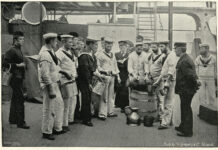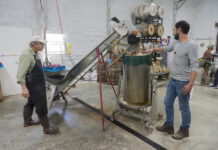The primary regulator of distilled spirit labeling is the Bureau of Alcohol, Tobacco & TFirearms (“ATF”), although other federal and state agencies also play limited roles.
This article discusses the certificate of label approval, or “COLA,” process that ATF imposes on distilled spirits labels, leaving other labeling issues and the related topics of formu- las, cartons and containers, and adver- tising for later articles.
Under the Federal Alcohol Administration Act, ATF requires producers and importers to obtain pre-approval of distilled spirit label designs before the labels are used in interstate commerce (e.g., across state or national borders). ATF accomplishes this through its COLA system: Except for minor changes allowed to previously-approved labels, distillers must obtain an approved COL A for each label design.
Procedure for Submitting
To obtain a COLA, the bottler and/or packer of the product must submit two completed copies of the executed COLA form bearing all labels appearing on the bottle to ATF Headquarters in Washington, DC. These are reviewed for compliance with the law by the ATF’s Alcohol Labeling & Formulation Division (“ALFD”). During business hours, ALFD’s customer service team (tel: 202-927-8140) makes itself available for questions by industry members.
An ATF-approved formula must accompany many COLAapplications, including those for flavored spirits, liqueurs and cordials. Obtaining an approved formula from ATF generally
takes between three and eight weeks; distillers should factor the timing of formula approval into their business plans. Other C O L A applications – generally those with painted-on or translu- cent labels – must include a filled bottle so that ATF can confirm that colored products do not affect the legibility or contrast of mandatory label information. Finally, some containers must receive “distinctive liquor bottle approval” if opaque decanters do not reveal the fill level of the bottle.
C O L A applicants can file by mail, overnight delivery , in per – son, or through several trade associations, lawfirms and con- sultants that provide label “walkover” services. In-person deliv- ery, either by the applicant or an agent, saves time by avoiding b o t h t h e m a i l s a n d A T F ’s i n t e r n a l m a i l – r o u t i n g s y s t e m . A T F hopes to commence electronic COLAfiling in early 2003.
Approval/Rejection
After review of a COLA application, ATF will either approve the application, reject the application, or approve the application with “qualifications.” ATF aims to process all applications within nine calendar days of receipt, but delays are common, particularly where labels must pass through ATF’s mailroom. In special circumstances, an applicant can request expedited treatment, but must present ALFD with cogent written reasons for doing so at the time of filing.
When ATF rejects a label, it will return the original appli- cations with a “Corrections Sheet” that briefly explains the reasons for denial. The distiller may then resubmit the correct- ed applications (attaching, where necessary, corrected labels) along with the Corrections Sheet to ATF for another attempt at approval. If the distiller believes ATF rejected the application in error, it can try to persuade ALFD to change its position. Many labeling disputes are clarified and resolved through informal discussions between ALFD officials and the distiller or its attorney or consultant.
An approval with qualifications allows the distiller to use the approved label subject, however, to one of any number of restrictions imposed by ATF. As with rejections, ATF is gener- ally willing to discuss COLA qualifications that the distiller believes are in error. A more formal appeals procedure is avail- able for rejections or qualifications, but the length of time ATF takes to consider and decide such appeals limits its usefulness.
An approved COLA allows the distiller to commence bottling the product for sale in interstate commerce. Moreover, an approved COLA generally precludes any later ATF punishment for use of the approved label provided, of course, that the label accurately reflects the contents of the bottle. ATF may revoke previously- approved COLAs, but the revocation procedure allows the bottler to continue using the label until ATF completes the revocation process, which may take a year or longer if the COLA holder exercises its rights to contest and appeal a revocation.
P e n a l t i e s
ATF possesses broad powers to punish distillers for bottling prior to obtaining a COLA, including the ability to first suspend, then revoke, a distiller’s basic permit – the federal license needed to distil. ATF often compromises mislabeling charges for monetary fines, which can be quite large in extreme circumstances: In the past several years ATF settled mislabeling proceedings against two wineries for $750,000 each. For products that a distiller does not plan to sell in interstate commerce, ATF requires distillers to submit a “certificate of exemption from label approval” by checking the appropriate box on the COLAform. All exemptions issued by ATF bear the qualification “For sale in [state] only.”
Practical Tips for Distillers
The COLA process generally does not present an insurmountable hurdle for the would-be distiller, although it may occasionally frustrate a particular marketing idea. In my experience, most problems arise from a failure to anticipate the formula and COLA process in timing a particular product introduction or labeling change. Distillers should try to obtain formulas and submit COLA applications early, pay careful attention to the legalities of label design, and avoid ordering production labels until after receiving ATF COLAapproval. These simple steps usually can tame the COLAprocess from a potential disaster to a mere bureaucratic hurdle.








